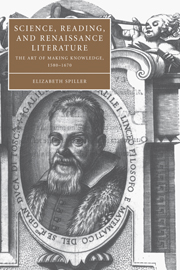Book contents
- Frontmatter
- Contents
- List of figures
- Acknowledgments
- Introduction: making early modern science and literature
- 1 Model worlds: Philip Sidney, William Gilbert, and the experiment of worldmaking
- 2 From embryology to parthenogenesis: the birth of the writer in Edmund Spenser and William Harvey
- 3 Reading through Galileo's telescope: Johannes Kepler's dream for reading knowledge
- 4 Books written of the wonders of these glasses: Thomas Hobbes, Robert Hooke, and Margaret Cavendish's theory of reading
- Afterword: fiction and the Sokal hoax
- Notes
- Index
- Cambridge Studies in Renaissance Literature and Culture
4 - Books written of the wonders of these glasses: Thomas Hobbes, Robert Hooke, and Margaret Cavendish's theory of reading
Published online by Cambridge University Press: 22 September 2009
- Frontmatter
- Contents
- List of figures
- Acknowledgments
- Introduction: making early modern science and literature
- 1 Model worlds: Philip Sidney, William Gilbert, and the experiment of worldmaking
- 2 From embryology to parthenogenesis: the birth of the writer in Edmund Spenser and William Harvey
- 3 Reading through Galileo's telescope: Johannes Kepler's dream for reading knowledge
- 4 Books written of the wonders of these glasses: Thomas Hobbes, Robert Hooke, and Margaret Cavendish's theory of reading
- Afterword: fiction and the Sokal hoax
- Notes
- Index
- Cambridge Studies in Renaissance Literature and Culture
Summary
Galileo's demonstration of how his “perspective glasses” made it possible to read the letters engraved on the Lateran Palace was not the last time that the telescope was used as a reading device. Sixty years later, Robert Hooke and other members of the Royal Society of London engaged in a kind of reenactment of Galileo's demonstration. In February of 1671, Hooke suggested that telescopes might provide a way for “a very speedy conveyance of intelligence from place to place.” Taking this “ingenious” idea out on the banks of the Thames river, the Royal Society experimented with reading coded texts from one side of the river to the other, using “letters of a foot long, and glasses of two feet long.” If this incident suggests a remarkable persistence to fantasies about using telescopes to “read” the skies, most of Hooke's contemporaries would have associated him not with the sky-writing of the telescope but with an instrument that promised new “intelligence” on a much smaller scale: the microscope.
Hooke introduced the microscope to the English reading public by training his lens not on distant letters but on the text that he was creating with his new lenses. He initiates this study in his stunningly popular Micrographia (1665) by reading the minutest of points: “the mark of a full stop, or period.”
- Type
- Chapter
- Information
- Science, Reading, and Renaissance LiteratureThe Art of Making Knowledge, 1580–1670, pp. 137 - 177Publisher: Cambridge University PressPrint publication year: 2004

